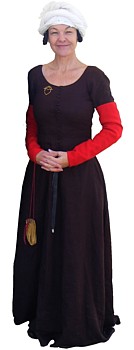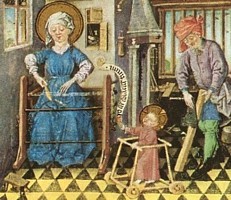|

Medieval
Merchant & Townswomen at Home
COOKING - CLEANING
- SHOPPING - GARDENING - LIVESTOCK & POULTRY
 Merchant
and townswomen are the closest to the kinds of women we are today.
Many women today have a full-time or part-time paid employment
or source of income and still have domestic duties to attend to
when they get home. We have the convenience of being able to buy
goods and services from shops, just as our medieval sisters also
did. Merchant
and townswomen are the closest to the kinds of women we are today.
Many women today have a full-time or part-time paid employment
or source of income and still have domestic duties to attend to
when they get home. We have the convenience of being able to buy
goods and services from shops, just as our medieval sisters also
did.

Cooking
The townswoman did most of her own cooking for herself and her
family and served the food to the table herself. Even if she had
servants, it was most likely that she would serve her husband
at the table herself and not leave this to the hired help.
Many daily items
were not prepared by the woman herself but bought from vendors
as we do today- bread, eggs and milk. Townswomen often did not
have land enough for a cow or chickens or a kitchen garden, like
those out of town or in the countryside.
Many manuscripts show women in a domestic setting with a large
iron post over the fire, a spoon in her hand in the act of cooking.
Wills of women often list valuable and broken cooking implements
giving us an idea of what kinds of items were used in a kitchen.
Women were often beneficiaries
of wills, which added to their own household goods in return for
years of loyal service.
The will of William Nunhouse,
a fishmonger from York leaves his servant, Margaret, a number
of goods:
Also I leave my servant
Margaret, a Prussian chest, a brass pot of my wife's choosing,
a coverlet, a blanket with a pair of sheets so that the aforesaid
Margaret does not leave or depart from my wife Joan's service
during the term of her hire and contract made between me and
her.
I also leave Cecily
my servant 2s.
Also I leave Agnes my
servant 12d.
Since she was able to buy
goods almost prepared, her cooking options varied more than the
woman in the country. She had no need to bake bread though she
might, and meat was available already cut from a butchery. Spices
and herbs were available to buy and this all improved the variety
of dishes that a townswoman was able to prepare.

Cleaning
A townswoman or merchant woman would almost certainly have had
domestic help, and passed the smaller jobs of cleaning to another
woman. Many of these were single women who had come to the town
from the country and were employed on a live-in basis. This also
gave a young woman the skills she needed to learn in household
management before marrying and setting up house of her own.

Spinning
and weaving
While major cloth production was not the job of the woman at home,
she might still be tasked with the production of narrow wares-
tablet woven bands, fingerloop laces and spinning to make thread
to sew with. Spinning and weaving on a domestic scale was considered
honest women's work.
Larger cloth amounts for coverlets, clothes and curtains would
more than likely be bought from a clothier- a merchant who sold
cloth. Generally speaking, most dwellings did not accomodate the
kind of space required to have a large loom set up.

Shopping
Shopping opportunities abounded for the woman who lived in a town
or a city. Specialty stores sold everything a woman might need
and there was more of a choice of items for sale. While some shops
carried a range of goods like an old-style corner store, most
shops were more of a specialist concern. Artisans were masters
of a particular thing, and their wares reflected their trade.
Shoes, jewellery, foods, spices, books and household items were
available. For every want, there was a specialist artisan who
made and sold it.
A woman might buy off-the-shelf or have special commission made
to order.

Gardening
Quite frankly, I know very little of the gardening practices of
the townswoman. There are indications for the upper and lower
classes, but extremely little information.
The Goodman of Paris, who was upper middle class, speaks to his
wife about tending the garden and growning roses, but certainly
this would be heavily dependant on what land was available, among
other things.

Livestock/Poultry
Some women on the edges of towns may have been able to keep chickens,
but those in the inner or bigger towns would have bought their
eggs from the markets or shops.

Child
raising
As with the rural and peasant women, a woman living in a town
would have reared her own children, breastfed her own babies and
worked around her household schedule, often with her servants
to assist her.
The illumination at right from Katherine of Cleaves Book of
Hours shows how a townswoman might successfully get on with
her household tasks like weaving and still supervise a small child;
much the same way mothers do today.

Copyright
© Rosalie Gilbert
All text & photographs within this site are the property of
Rosalie Gilbert unless stated.
Art & artifact images remain the property of the owner.
Images and text may not be copied and used without permission.
|